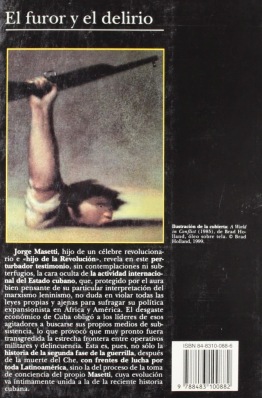The Books on the Cuban Death by Orlando Luis Pardo Lazo
There is a literary genre more popular than the rest of Cuban literature, which, by the way, has become a dying phenomenon since a few decades ago.
That genre is the “books on death,” the books written by the serial killers in the island (who spread to Latin America), as if they were perverse characters from an ideological thriller called the Revolution.
Today, 15 years late, I felt the spontaneous urge to read one of the vital and monumental works on Cuban deaths: “The Fury and the Delirium” (Tusquets, 1999), by the killer son of killers and earning wages from killers Jorge Masetti, whose destiny to become a depressing or best-selling star I ignore, but whose prose I will always admire for its morbid monstrosity.
This grotesque genre has no limits, which is why it is superior to all those who can publish the self-censured Cuban writers. It combines an odd Oedipus with the Macho-Chief (or the Mafia in Chief) with a frigidity that, so as not to be recognized as suicidal, becomes criminal.
On the one hand, the horror (more than fury) of failing the totalitarian state. On the other hand, the disaster (more than delirium) in which the narrator’s life is summed up, turning in circles like a shark thirsty for blood, in exchange for some kind of feeling for his sterile and devalued life. Without worth or meaning. Death as a moral.
In this line of reasoning, whoever is capable of killing, is good and beautiful and was right. Those who let themselves be killed are fragile and ugly and out of place and because of that they left the world.
These serial killers act out of a solipsistic atrocity, but not for a moment do they cease having contact with the rest of the world. And this is where the vulgar genre shines for its sinister sincerity: there are no politics, or art, or sport, or disease, or accident, or fame, or frontiers, or nations, or history, or memory, or identity, or anything that isn’t agreed upon a priori by the heroes of pure action, by the pre-political slaughters in this case the international Castroism (whatever the sign is: Castroism is the pluribus unum of our time).
Jorge Masetti thus narrates from the dark holes that we Cubans, like a lost nation, never suspect that without works like these. In this book we endlessly hear the idle chatter of power. We spy the parliamentary halls of the evil ministries, who voluntarily administer mass murder. We intuit the insidious intelligence, that traces the puppet show that is our biography of citizens who serve as props, as grim. We realize unspeakable things in “The Fury and the Delirium” and its agonizing analyses. Things that are literally unspeakable.
In this book, finally, is the nation’s inner voice, its unlivable novel, its intimate and intimidating corpse-like groan. And thanks to this genre we understand, much more than the author (who only thinks he created catharsis), that we Cubans who are still alive are always complicit or at fault, because at some dead point in our lives we have been forgiven by State Security.
On more than one level, and of this Jorge Masetti is perfectly aware, he who survives is a traitor. His options are now simple (perhaps he already chose in these 15 years of delay in my re-reading): insanity or holiness.
After the Cuban Revolution, death will again become meaningless. Castroism has, well, a role to endlessly fulfill: dose the evil that men freely do unto other men, and if possible, precipitate the evil hand of God, his fury is brittle for those who are still alive with so many enemies intermixed.
Translated by: Bianca Martinez
7 July 2014



